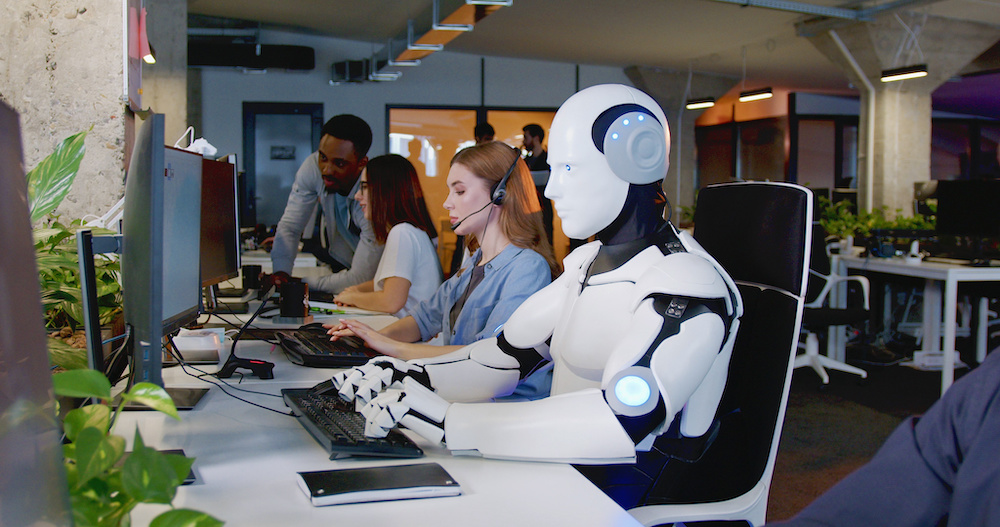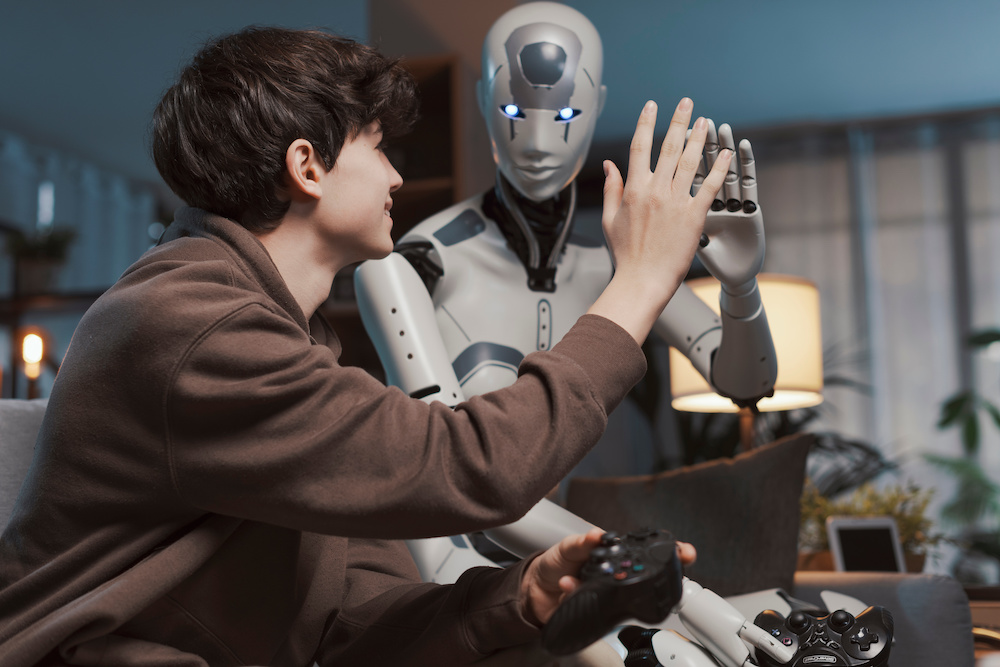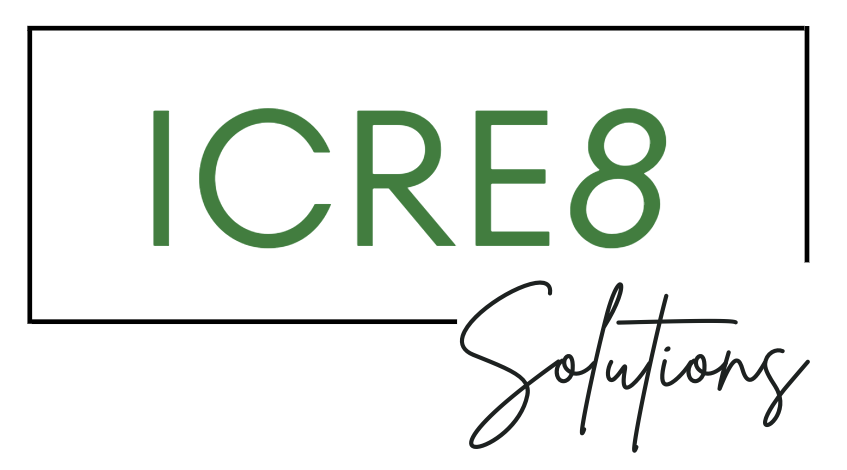From chatbots to image generators, artificial intelligence appears to have sprung up seemingly “overnight,” automating countless, tedious administrative tasks. Although we’re not quite living in The Jetsons or even Big Hero 6 (who doesn’t love Baymax?), concerns continue to arise regarding the effects of AI on the job market.
Although 81 percent of office workers believe AI improves their productivity and performance, roughly a third of all workers believe their jobs will soon be replaced by technology, according to recent market research.
While Goldman Sachs touts that AI could increase the global GDP by seven percent, their report also states that roughly two-thirds of jobs in the U.S. are already exposed to “some degree” of AI automation. Of those two-thirds, somewhere between a quarter to half of those occupations could be completely replaced by artificial intelligence.
The statistics sound grim, given we’re already trekking through a pretty brutal economy. Nevertheless, let’s revisit that 81 percent. How does AI improve productivity in the workplace? Where do we draw the line between efficiency and completely replacing ourselves with robots?
Does AI Improve Productivity? Or is it Artificial Productivity?

It’s no secret that AI, even in its current state, can do just about anything you need it to. Artificial intelligence can draft emails, documents, create videos, generate images, produce songs, and even generate snippets of code or spreadsheet formulas. Google’s Gemini is particularly impressive, as it can even give you real links to online sources where you can find more information about a given topic.
But how much of it is really useful? How do we quantify the value of AI output?
Let’s take a step back for a moment to look at the big-picture issues here. An encyclopedia is only useful if you know how to find what you’re looking for. Otherwise, it’s just a heavy book with a lot of needless information.
Likewise, Google Search has been around for almost 26 years. And yet, most people still don’t know how to efficiently query the search engine to find what they’re looking for.
The same holds true for many academic or scholarly databases – they’re populated with hundreds of thousands of articles. But what use are these databases if you don’t know how to search for results that’ll actually provide you with value?
In addition to not knowing how to effectively search the web, media literacy and the ability to disseminate misinformation are also incredibly lacking today. Not to mention, so much of the internet has already been clogged up with content farm articles, making it difficult to find quality online resources.
If we’re at a point where people still don’t know how to navigate the web and identify correct information, then how the hell are they supposed to use AI to enhance their productivity? Is productivity a measure of the quality of work, or the quantity of work completed in the span of a day or week?
In other words, you could use AI to create project proposals, contracts, financial strategies, and website HTML & CSS. But if you don’t know what a proposal, a contract, a financial strategy, or a website framework is supposed to look like, there’s no quality assurance.
At that point, it’s not real productivity. It’s artificial productivity. The illusion of getting work done when you’re just pedaling hot – potentially false – garbage. Sounds pretty inefficient.
The Critical Need for Human Oversight
Fortunately, we’re at a point in society where people with years of experience within specific fields still exist. Although that sounds like common sense, that statement might not be true for much longer.
At this rate, we’re headed toward a future where we’re not going to need consultants to build things for companies. Instead, companies are going to need consultants who can take on an advisory role to oversee, manage, and edit AI output.
The freelance writing industry is a great example of this. For a long time, freelance writers were a hot commodity for companies who needed blog content to boost their SEO ranking. Now it’s a dwindling field. Instead of needing writers to generate content, these companies are seeking individuals with industry experience who can fact-check and edit AI blog content.
In the same vein, we’re at a precipice where people are going to need consultants who know how to effectively ask AI questions to get the right results. Furthermore, these consultants will need to have the learned experience required to provide quality assurance over the AI output.
After all, when ChatGPT was first released in 2022, we all saw how the viral chatbot would confidently lie and create fake journal citations when asked for sources in an AI-generated essay.
When it comes to the arts, AI image generation still struggles with generating too many fingers and garbled text.
With incredibly intelligent software that’s also very confident in its own ignorance, there’s a dire need for individuals who know how to call AI out on its BS.
Navigating AI with Confidence As Opposed to Fear

Ready or not, AI is taking over and will continue to conquer seemingly asinine aspects of the nine-to-five work life. While it’s already threatening jobs within many incredibly different sectors, there remains a critical need for human oversight.
Here at iCre8Solutions, we not only have the boots-on-the-ground experience needed to execute our jobs, but we also have an intimate familiarity with how to use AI efficiently.
To learn more about how your business can harness the power of AI, as opposed to being overtaken by AI altogether, contact us.
Sources
- Flick Society. (2020, September 28). Tadashi introducing baymax health care companion to hiro hamada Big hero 6 1080p [Video]. YouTube. https://www.youtube.com/watch?v=jbKSvOfqxF0
- Goldman Sachs. (2023, April 5). Generative AI could raise global GDP by 7%. Goldman Sachs. https://www.goldmansachs.com/intelligence/pages/generative-ai-could-raise-global-gdp-by-7-percent.html
- Matthias, M. (2023, August 25). Why does AI art screw up hands and fingers? | Explanation, Tools, & Facts. Encyclopedia Britannica. https://www.britannica.com/topic/Why-does-AI-art-screw-up-hands-and-fingers-2230501
- Ray, K. (2024, February 28). The history of Google Search. Site Centre. https://www.sitecentre.com.au/blog/history-of-google-search
- SEO.ai. (2024, January). AI Replacing Jobs Statistics: The impact on employment in 2024. https://seo.ai/blog/ai-replacing-jobs-statistics
- TelevisionVanguard. (2018, June 16). TV’s Saturday Morning Cartoon Legacy: The Jetsons (Rosey: head of the household) [Video]. YouTube. https://www.youtube.com/watch?v=1pphyvgd7-k
- Valerie. (2023, October 30). Why AI can’t write text in an image and what you can do about it. Medium. https://medium.com/dare-to-be-better/can-we-read-in-a-dream-and-how-to-teach-ai-to-write-text-in-an-image-a2850fceb0df
- Welborn, A. (2023, March 14). ChatGPT and fake citations – Duke University Libraries blogs. Duke University Libraries Blogs. https://blogs.library.duke.edu/blog/2023/03/09/chatgpt-and-fake-citations/

